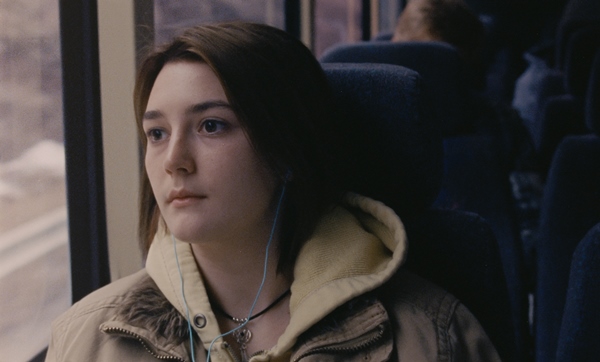

Never Rarely Sometimes Always opens at a high school talent show. There are some dancers, an Elvis impersonator, the lights are bright, and there seems to be some earnest excitement in the auditorium. It almost tricks viewers into thinking that they are watching a different film than what it eventually becomes. Finally, a teenage girl takes the stage and plays a love song on her guitar. Someone in the audience screams, “slut,” there is some laughter, and she pauses mid-performance. She looks to her family in the audience, all of whom are silent. She finishes the song.
This is Eliza Hittman’s third feature, and it’s quite something. It begins in a working-class town in Pennsylvania, where 17-year-old Autumn (Sidney Flanigan) goes to school, works as a supermarket cashier, and finds out that she’s pregnant. She and her cousin Skylar (Talia Ryder) take a bus to New York City without telling their families so that Autumn can get an abortion without having to obtain parental consent, as required by Pennsylvania law. With no place to sleep, they wander the streets, hang out at the Port Authority, and sometimes are forced to put up with predatory men while they remain in the city longer than expected.
It is a film full of pregnant silence in which viewers are meant to sit with the young women and their angst and discontent—which they rarely voice—as they tread uncertain territory. This silence is one of the film’s enormous strengths. Skylar’s discovery that Autumn is pregnant, for instance, is not conveyed with dialogue but through accrued observation, and is consequently much more powerful. Both teens have not been taught to speak up for themselves, or do not come from a home where that is permissible, and both of suffer the consequences.
Hittman has a remarkable interest in observing faces, especially Autumn’s, and it is a curiosity that is richly rewarding. Flanigan expertly conveys someone who wants to keep her feelings under the surface so well that in the few moments when Autumn fails to do so are exceptionally poignant.
It’s certainly a political film, and this aspect is neither overstated nor shied away from. It’s partially a portrayal of how difficult it is in many parts of the United States to have access to abortion, and the film’s treatment of the subject is admirably frank about the medical process of the procedure. We also come to deeply value the kindness of several characters, notably several Planned Parenthood staff members and particularly Skylar, who asks for very little in return from Autumn while forced to endure quite a lot.
I did wonder sometimes if Hittman relied too much on silence. Would Autumn and Skylar really have this little to say to one another on their trip? Meanwhile on the bus to New York, a young hipster from Philadelphia (Théodore Pellerin) intrudes upon their silence. He’s strikingly clueless and can’t take a hint, and while his presence certainly well illustrates the kind of unthinking male privilege that Autumn and Skylar are up against, he’s not a well realized character, given how much screen time he has.
Still, this will be a film that rewards and touches. Any viewer who wants a frank look at some of the rights the current administration has put in jeopardy won’t want to miss it. More importantly, compassion is never absent.






The movie Never Rarely Sometimes Always (2020) Never Rarely Sometimes Always can often be hard to watch, but it’s the best film of the year, and it’s also the most essential movie to come out in recent years.